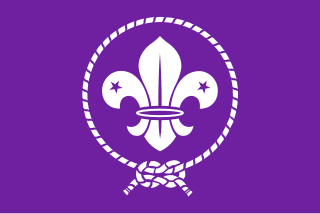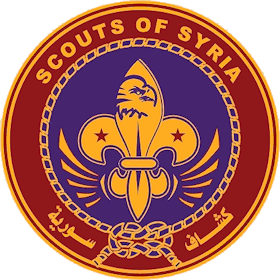
Scouting, also known as the Scout Movement, is a worldwide youth social movement employing the Scout method, a program of informal education with an emphasis on practical outdoor activities, including camping, woodcraft, aquatics, hiking, backpacking, and sports. Another widely recognized movement characteristic is the Scout uniform, by intent hiding all differences of social standing in a country and encouraging equality, with neckerchief and campaign hat or comparable headwear. Distinctive uniform insignia include the fleur-de-lis and the trefoil, as well as merit badges and other patches.

The World Organization of the Scout Movement is the largest international Scouting organization. WOSM has 174 members. These members are recognized national Scout organizations, which collectively have around 43 million participants. WOSM was established in 1922, and has its operational headquarters at Kuala Lumpur, Malaysia and its legal seat in Geneva, Switzerland. It is the counterpart of the World Association of Girl Guides and Girl Scouts (WAGGGS).

The Scout Promise is a spoken statement made by a child joining the Scout movement. Since the publication of Scouting for Boys in 1908, all Scouts and Girl Guides around the world have taken a Scout promise or oath to live up to ideals of the movement, and subscribed to a Scout Law. The wording of the Scout Promise and Scout Law have varied slightly over time and from country to country. Although most Scouting and Guiding organizations use the word "promise", a few such as the Boy Scouts of America tend to use "oath" instead.

The European Scout Region is one of six geographical subdivisions of the World Organization of the Scout Movement, headquartered in Geneva, Switzerland, with a satellite office in Brussels, Belgium.

The coeducational Organization of the Scout Movement of Kazakhstan was officially founded in 1992, and received World Organization of the Scout Movement recognition on January 16, 2008. In 2011, it had 1,223 members.

Lietuvos skautija, the primary national Scouting organization of Lithuania, became a member of the World Organization of the Scout Movement in 1997. The coeducational Lietuvos skautija has 1,446 members as of 2012.

The Arab Scout Region also known as the Arab Scout Organization is the regional support centre of the World Scout Bureau of the World Organization of the Scout Movement, headquartered in Cairo, Egypt. By 1954, Scouting had become so popular in Arab countries that WOSM established the Arab Scout Region in Damascus.

The Africa Scout Region is the divisional office of the World Scout Bureau of the World Organization of the Scout Movement, headquartered in Nairobi, Kenya, with satellite offices in Cape Town, South Africa, and Dakar, Senegal. The Africa Region services Scouting in Sub-Saharan Africa and neighboring islands that are recognized members of the World Organization of the Scout Movement (WOSM). Currently, the region has 39 member National Scout Associations/Organizations and 11 potential members. There are about one million registered Scouts in Africa, though it is suspected that there are about twice that number in the region. The large nations of Mali, Guinea-Bissau and the Central African Republic, and several smaller nations, are not yet WOSM members, for various reasons.

Scouts of Syria is the national Scout and Guide organization of Syria. Scouting in Syria was founded in 1912; Guiding started in the 1950s. The coeducational association serves 9,358 members and is a member of both the World Organization of the Scout Movement and the World Association of Girl Guides and Girl Scouts.

The Central African Republic is one of 29 countries where Scouting exists but where there is no National Scout Organization which is a member of the World Organization of the Scout Movement at the present time. Scouting was founded in French Equatorial Africa in 1941, and was first recognized in 1969. The Fédération du scoutisme centrafricain, or FESCA, is the national federation of seven Scouting organizations. While FESCA was still recognized in 1990, there were 7,000 Scouts, and total membership at the end of 1998 was reported as being the same number.

The Association des Scouts de Djibouti is the national Scouting organization of Djibouti.

The Corpo Nacional de Escutas da Guiné-Bissau was the national Catholic Scouting organization of Guinea-Bissau.

The Associação dos Escuteiros de São Tomé e Príncipe is the national Scouting organization of São Tomé and Príncipe. The organization was founded in 1993 and is affiliated to the World Organization of the Scout Movement (WOSM), since 11 May 2017. It is a member of the Comunidade do Escutismo Lusófono. In 1995, the organization had 421 members.

Somalia is one of 29 countries where Scouting exists but there is no National Scout Organization which is a member of the World Organization of the Scout Movement at the present time, and no organization was ever recognized by WOSM during the nation's periods of Scouting history.

The Seychelles Scout Association (SSA) is the national Scouting organization of the Seychelles. Scouting in Seychelles was founded in 1927 and became a member of the World Organization of the Scout Movement (WOSM) in 2002. The association has 372 members.

There are various controversies and conflicts that involve the Scouting movement. Scouting has sometimes become entangled in social controversies such as in nationalist resistance movements in India. Scouting was introduced to Africa by British officials as an instrument of colonial authority but became a subversive challenge to the legitimacy of British imperialism as Scouting fostered solidarity amongst African Scouts. There are also controversies and challenges within the Scout Movement itself such as current efforts to turn Scouts Canada into a democratic organization.

The International Catholic Conference of Scouting (ICCS) is an autonomous, international body committed to promoting and supporting Catholic Scout associations and to be a link between the Scout movement and the Catholic Church. Its headquarters is located in Rome, Italy.

The South Sudan Scout Association is the national Scouting organization of South Sudan. It was founded in 2011 following the independence of South Sudan, which became an independent country on July 9, 2011, at which moment the organization split from the Sudan Scouts Association, a member of the World Organization of the Scout Movement. In January 2013, the organization had about 2000 members.

Winston Adams (1940—) is a South African Scout leader who has held regional and international leadership positions in the World Scout Bureau's Africa Scout Region.



















